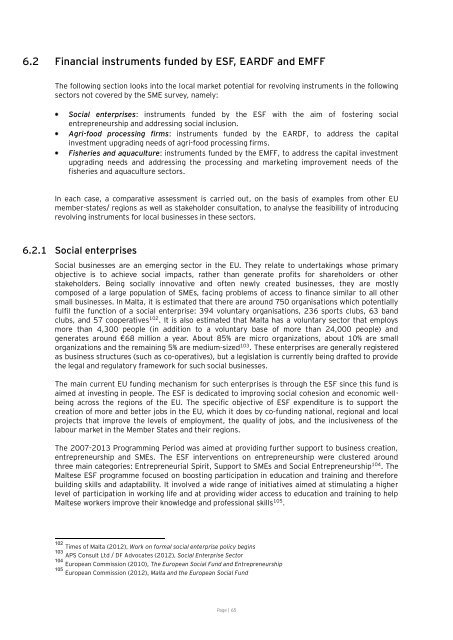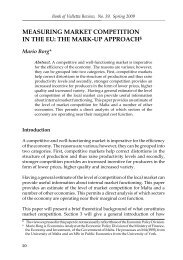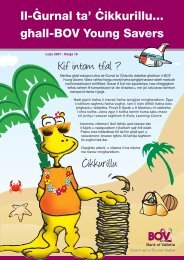Market Gaps on Access to Finance - Bank of Valletta
Market Gaps on Access to Finance - Bank of Valletta
Market Gaps on Access to Finance - Bank of Valletta
You also want an ePaper? Increase the reach of your titles
YUMPU automatically turns print PDFs into web optimized ePapers that Google loves.
6.2 Financial instruments funded by ESF, EARDF and EMFF<br />
The following secti<strong>on</strong> looks in<strong>to</strong> the local market potential for revolving instruments in the following<br />
sec<strong>to</strong>rs not covered by the SME survey, namely:<br />
Social enterprises: instruments funded by the ESF with the aim <strong>of</strong> fostering social<br />
entrepreneurship and addressing social inclusi<strong>on</strong>.<br />
Agri-food processing firms: instruments funded by the EARDF, <strong>to</strong> address the capital<br />
investment upgrading needs <strong>of</strong> agri-food processing firms.<br />
Fisheries and aquaculture: instruments funded by the EMFF, <strong>to</strong> address the capital investment<br />
upgrading needs and addressing the processing and marketing improvement needs <strong>of</strong> the<br />
fisheries and aquaculture sec<strong>to</strong>rs.<br />
In each case, a comparative assessment is carried out, <strong>on</strong> the basis <strong>of</strong> examples from other EU<br />
member-states/ regi<strong>on</strong>s as well as stakeholder c<strong>on</strong>sultati<strong>on</strong>, <strong>to</strong> analyse the feasibility <strong>of</strong> introducing<br />
revolving instruments for local businesses in these sec<strong>to</strong>rs.<br />
6.2.1 Social enterprises<br />
Social businesses are an emerging sec<strong>to</strong>r in the EU. They relate <strong>to</strong> undertakings whose primary<br />
objective is <strong>to</strong> achieve social impacts, rather than generate pr<strong>of</strong>its for shareholders or other<br />
stakeholders. Being socially innovative and <strong>of</strong>ten newly created businesses, they are mostly<br />
composed <strong>of</strong> a large populati<strong>on</strong> <strong>of</strong> SMEs, facing problems <strong>of</strong> access <strong>to</strong> finance similar <strong>to</strong> all other<br />
small businesses. In Malta, it is estimated that there are around 750 organisati<strong>on</strong>s which potentially<br />
fulfil the functi<strong>on</strong> <strong>of</strong> a social enterprise: 394 voluntary organisati<strong>on</strong>s, 236 sports clubs, 63 band<br />
clubs, and 57 cooperatives 102 . It is also estimated that Malta has a voluntary sec<strong>to</strong>r that employs<br />
more than 4,300 people (in additi<strong>on</strong> <strong>to</strong> a voluntary base <strong>of</strong> more than 24,000 people) and<br />
generates around €68 milli<strong>on</strong> a year. About 85% are micro organizati<strong>on</strong>s, about 10% are small<br />
organizati<strong>on</strong>s and the remaining 5% are medium-sized 103 . These enterprises are generally registered<br />
as business structures (such as co-operatives), but a legislati<strong>on</strong> is currently being drafted <strong>to</strong> provide<br />
the legal and regula<strong>to</strong>ry framework for such social businesses.<br />
The main current EU funding mechanism for such enterprises is through the ESF since this fund is<br />
aimed at investing in people. The ESF is dedicated <strong>to</strong> improving social cohesi<strong>on</strong> and ec<strong>on</strong>omic wellbeing<br />
across the regi<strong>on</strong>s <strong>of</strong> the EU. The specific objective <strong>of</strong> ESF expenditure is <strong>to</strong> support the<br />
creati<strong>on</strong> <strong>of</strong> more and better jobs in the EU, which it does by co-funding nati<strong>on</strong>al, regi<strong>on</strong>al and local<br />
projects that improve the levels <strong>of</strong> employment, the quality <strong>of</strong> jobs, and the inclusiveness <strong>of</strong> the<br />
labour market in the Member States and their regi<strong>on</strong>s.<br />
The 2007-2013 Programming Period was aimed at providing further support <strong>to</strong> business creati<strong>on</strong>,<br />
entrepreneurship and SMEs. The ESF interventi<strong>on</strong>s <strong>on</strong> entrepreneurship were clustered around<br />
three main categories: Entrepreneurial Spirit, Support <strong>to</strong> SMEs and Social Entrepreneurship 104 . The<br />
Maltese ESF programme focused <strong>on</strong> boosting participati<strong>on</strong> in educati<strong>on</strong> and training and therefore<br />
building skills and adaptability. It involved a wide range <strong>of</strong> initiatives aimed at stimulating a higher<br />
level <strong>of</strong> participati<strong>on</strong> in working life and at providing wider access <strong>to</strong> educati<strong>on</strong> and training <strong>to</strong> help<br />
Maltese workers improve their knowledge and pr<strong>of</strong>essi<strong>on</strong>al skills 105 .<br />
102 Times <strong>of</strong> Malta (2012), Work <strong>on</strong> formal social enterprise policy begins<br />
103 APS C<strong>on</strong>sult Ltd / DF Advocates (2012), Social Enterprise Sec<strong>to</strong>r<br />
104 European Commissi<strong>on</strong> (2010), The European Social Fund and Entrepreneurship<br />
105 European Commissi<strong>on</strong> (2012), Malta and the European Social Fund<br />
Page | 65







